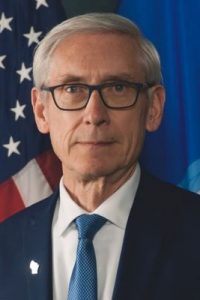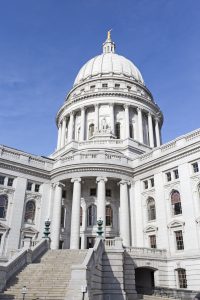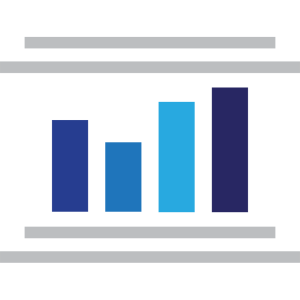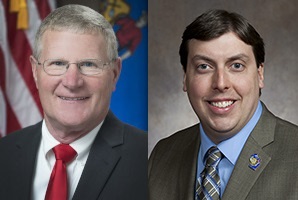by Dan Rossmiller | Jan 26, 2023 | Legislative Update Blog, State Budget, State Issue
 In his fifth State of the State address as governor, Gov. Tony Evers outlined proposals to spend nearly $1.3 billion on mental health initiatives, addressing PFAS and bolstering the state’s workforce, among other things. Evers also called for a big boost in state aid to local governments and schools. In his speech, Evers noted the record state budget surplus as well as the record balance in the state’s Budget Stabilization (a/k/a “Rainy Day”) Fund.
In his fifth State of the State address as governor, Gov. Tony Evers outlined proposals to spend nearly $1.3 billion on mental health initiatives, addressing PFAS and bolstering the state’s workforce, among other things. Evers also called for a big boost in state aid to local governments and schools. In his speech, Evers noted the record state budget surplus as well as the record balance in the state’s Budget Stabilization (a/k/a “Rainy Day”) Fund.
Previewing the two-year state budget proposal he will unveil on Feb.15, Evers used his annual State of the State address to tout a proposal to make the “Get Kids Ahead” a permanent state program by investing more than $270 million to ensure every student has access to mental health services.
Details of Evers’ plan were released along with the speech and call for providing:
(more…)
by Chris Kulow | Jan 13, 2023 | Legislative Update Blog, State Budget
 A new memo from the non-partisan Legislative Fiscal Bureau (LFB) shows what revenue limit adjustments would have been if automatic inflationary increases (tied to CPI indexing) that were a feature of Wisconsin school funding from 1995-96 through 2008-09 were still in place and compares those to the actual increases provided by the state.
A new memo from the non-partisan Legislative Fiscal Bureau (LFB) shows what revenue limit adjustments would have been if automatic inflationary increases (tied to CPI indexing) that were a feature of Wisconsin school funding from 1995-96 through 2008-09 were still in place and compares those to the actual increases provided by the state.
If you attended a WASB Regional Meeting or Advocacy Workshop, we showed you a chart illustrating the differences.
The new LFB memo also includes estimates of what inflationary increases per pupil would be for 2023-24 and 2024-25, the fiscal/school years covered by the upcoming 2023-25 state budget:
According to the memo, “Based on the January, 2023, projections of quarterly inflation by S&P Global, it is estimated that the per pupil adjustments would be $392.79 in 2023-24 and $403.00 in 2024-25.”
See the full memo.
by Chris Kulow | Jan 5, 2023 | Legislative Update Blog, State Budget
 From the Governor’s office release: “Gov. Tony Evers today announced upcoming locations and dates to continue his statewide ‘Doing the Right Thing’ listening session tour, including another virtual listening session, as well as visits to Wausau, Superior, and Eau Claire.
From the Governor’s office release: “Gov. Tony Evers today announced upcoming locations and dates to continue his statewide ‘Doing the Right Thing’ listening session tour, including another virtual listening session, as well as visits to Wausau, Superior, and Eau Claire.
“All participants should register to attend at the links below. Wisconsinites are also welcome to submit written comments on any topic at any time before or after the listening sessions here.” (more…)
by Chris Kulow | Jan 5, 2023 | Legislative Update Blog, State Budget
 From the Wisconsin Policy Forum: “Driven down by a $1 billion income tax cut and tight limits on property taxes, Wisconsin’s state and local tax burden fell in 2022 to its lowest level on record. Local taxes as a share of income have never been lower in more than a half century of data, and state and federal taxes on families and businesses are also near historic lows.”
From the Wisconsin Policy Forum: “Driven down by a $1 billion income tax cut and tight limits on property taxes, Wisconsin’s state and local tax burden fell in 2022 to its lowest level on record. Local taxes as a share of income have never been lower in more than a half century of data, and state and federal taxes on families and businesses are also near historic lows.”
In fiscal year 2022, state and local tax revenues fell to just under 10.1% of personal income in the state, down from 10.3% in 2021. That was the lowest level since the Wisconsin Policy Forum and its predecessor the Wisconsin Taxpayers Alliance began tracking the state-local tax burden in 1970.
One of the more eye-opening findings of the report was that state tax revenues have grown by 56.9% since 2010. Local tax collections, on the other hand, have grown by only 23.7% over that same period, or less than half as much as state revenues. This is illustrated in Figure 7 of the report.
See the full report.
by Chris Kulow | Dec 23, 2022 | Legislative Update Blog, State Budget
 The Wisconsin Policy Forum recently highlighted their top five research findings for 2022. These were chosen using the “criteria that the finding contains newly uncovered information and that it is relevant to upcoming policy debates at the state or local level”. Included in their top five:
The Wisconsin Policy Forum recently highlighted their top five research findings for 2022. These were chosen using the “criteria that the finding contains newly uncovered information and that it is relevant to upcoming policy debates at the state or local level”. Included in their top five:
“Wisconsin falls to middle of the pack in school spending. In July, we took one of our periodic looks at Wisconsin’s school spending compared to other states and found a continuation of the decline in the state’s ranking that we had observed in recent years (Wisconsin’s Ranks in School Spending, Tax Burden Fall Together). Per 2020 Census Bureau data, Wisconsin’s spending of $12,740 per student on public elementary and secondary education was 25th in the nation and 5.6% below the national average. In 2002 – the earliest year for which comparable data are available – Wisconsin ranked 11th. Not surprisingly, given that state and local taxes are the primary funding source for K-12 education, the decline in Wisconsin’s school spending rank was consistent with its declining tax burden (measured by the ratio of state and local taxes to personal income), which fell from fifth in the U.S. in 2002 to 23rd in 2019.”
We had previously blogged about the study here.
by Chris Kulow | Dec 16, 2022 | Legislative Update Blog, State Budget
 Senate Majority Leader Devin LeMahieu (R-Oostburg) announced Senate Committees and committee membership for the 2023-24 Legislative Session. We now now the full membership of the budget-writing Joint Finance Committee (JFC).
Senate Majority Leader Devin LeMahieu (R-Oostburg) announced Senate Committees and committee membership for the 2023-24 Legislative Session. We now now the full membership of the budget-writing Joint Finance Committee (JFC).
The JFC will again be led by Co-Chairs Senator Howard Marklein and Representative Mark Born (pictured). It is also worth noting the presence of five new members on the committee that will lead the legislature’s role in the state budget process.
JFC members for 2023-24:
|
Senate
- Sen. Howard Marklein (R-Spring Green), Co-Chair
- Sen. Duey Stroebel (R-Saukville), Vice-Chair
- Sen. Mary Felzkowski (R-Tomahawk)
- Sen. Joan Ballweg (R-Markesan)
- Sen. Patrick Testin (R-Stevens Point)*
- Sen. Eric Wimberger (R-Green Bay)*
- Sen. LaTonya Johnson (D-Milwaukee)
- Sen. Kelda Roys (D-Madison)*
|
Assembly
- Rep. Mark Born (R-Beaver Dam), Co-Chair
- Rep. Terry Katsma (R-Oostburg), Vice-Chair
- Rep. Shannon Zimmerman (R-River Falls)
- Rep. Tony Kurtz (R-Wonewoc)
- Rep. Jessie Rodriguez (R-Oak Creek)
- Rep. Alex Dallman (R-Green Lake)*
- Rep. Evan Goyke (D-Milwaukee)
- Rep. Tip McGuire (D-Kenosha)*
|
-
*- New Member for 2023-24
 In his fifth State of the State address as governor, Gov. Tony Evers outlined proposals to spend nearly $1.3 billion on mental health initiatives, addressing PFAS and bolstering the state’s workforce, among other things. Evers also called for a big boost in state aid to local governments and schools. In his speech, Evers noted the record state budget surplus as well as the record balance in the state’s Budget Stabilization (a/k/a “Rainy Day”) Fund.
In his fifth State of the State address as governor, Gov. Tony Evers outlined proposals to spend nearly $1.3 billion on mental health initiatives, addressing PFAS and bolstering the state’s workforce, among other things. Evers also called for a big boost in state aid to local governments and schools. In his speech, Evers noted the record state budget surplus as well as the record balance in the state’s Budget Stabilization (a/k/a “Rainy Day”) Fund. A new memo from the non-partisan Legislative Fiscal Bureau (LFB) shows what revenue limit adjustments would have been if automatic inflationary increases (tied to CPI indexing) that were a feature of Wisconsin school funding from 1995-96 through 2008-09 were still in place and compares those to the actual increases provided by the state.
A new memo from the non-partisan Legislative Fiscal Bureau (LFB) shows what revenue limit adjustments would have been if automatic inflationary increases (tied to CPI indexing) that were a feature of Wisconsin school funding from 1995-96 through 2008-09 were still in place and compares those to the actual increases provided by the state. From the
From the  Senate Majority Leader Devin LeMahieu (R-Oostburg) announced Senate Committees and committee membership for the 2023-24 Legislative Session. We now now the full membership of the budget-writing Joint Finance Committee (JFC).
Senate Majority Leader Devin LeMahieu (R-Oostburg) announced Senate Committees and committee membership for the 2023-24 Legislative Session. We now now the full membership of the budget-writing Joint Finance Committee (JFC).